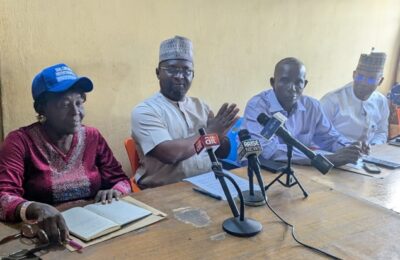In the ever-evolving landscape of pneumatological movements within Africa’s ecclesial context, the late Prophet Temitope Balogun Joshua, charismatic founder of The Synagogue, Church of All Nations (SCOAN), stands as both an enigmatic theophanic agent and a misunderstood ecclesial anomaly. His existence, marked by mysticism, power, hermeneutical tension, and kerygmatic potency, mirrored the pathos of a vessel burdened with the kenotic call of divine election. As Nigeria and the global ecclesia continue to engage in posthumous theological reflection, the legacy of TB Joshua beckons us toward a more profound theo-anthropological discourse—not merely on the praxis of signs and wonders, but on the theodicy of prophetic suffering, the cruciformity of leadership, and the eschatological hope born from divine agony.
The prophetic travail of TB Joshua did not commence under the klieg lights of ecclesial celebration but in the obscurity of wilderness formation, spiritual gestation, and social ostracization. His theogenic narrative defied conventional ecclesiastical trajectories; unlike many who ascended through denominational ordination or scholastic formation, Joshua emerged from a liminal encounter with the divine. According to his pneumatological testimony, he dwelt in his mother’s womb for 15 months, underwent a mosaic fast in sylvan solitude, and endured protracted periods of divine incubation. Though met with skepticism, these narratives constitute the apostolic substratum of a transcontinental ministry that would eventually manifest healing charismata, deliverance efficacy, and apostolic hospitality to the nations.
Yet beneath the theurgical spectacles was a soul in travail. A prophet marginalized by ecclesial gatekeepers. A pneumatocrat scrutinized by state apparatus. An anointed vessel whose sacred oil elicited ecclesial suspicion even as it brought balm to multitudes. TB Joshua’s agony was both metanoetic and institutional. Though a philanthropist and oracle, he remained a liminal figure within Nigeria’s ecclesial oligarchy.
He once proclaimed, “The bigger your destiny, the tougher your journey.” This axiom encapsulates his kenotic pilgrimage—a telos marked by persecution and perseverance. He embraced theologia crucis, refusing to retaliate against his traducers. His silence, saturated with prophetic gravitas, became a homily. While others sought to exorcise his credibility, his ministry exorcised demons. His fruits bore witness where his voice remained still.
Perhaps the profundity of his agony was not the external censure, but the internal crucifixion—the agony of ecclesial betrayal, of unreciprocated agape, of washing feet that would later walk away. Yet, like Paul, he bore the stigmata of the apostolic. Like Elijah, he endured prophetic solitude. Like Christ, he dispensed mercy to those who hurled stones.
Today, his legacy is a theological paradox. To some, he was a pneumatological paragon; to others, a charismatic controversy. Yet none can nullify the ontological weight of his impact. From favela to throne room, TB Joshua’s pneuma permeated borders. Emmanuel TV functioned as a digital tabernacle for the disconsolate. His homilies, though devoid of scholastic pomp, were eschatologically potent.
In a recent homiletic assertion, Prophet Ubert Angel proclaimed, “Prophet T.B. Joshua is a spirit.” This pneumatological proclamation suggests that Joshua’s charisma transcends corporeality—his spirit now integrated into the communion of saints, his legacy operative in the pneumatosphere. For many, he has become not a memory but a mystic presence—an ongoing kairos in the life of the ekklesia.
One painful truth remains: many of the lives transformed through the agency of his divine charismata now stand mute—reticent like Peter after the arrest of Jesus—ashamed to identify with the prophet whose oil once anointed their destinies. It is a silent betrayal echoing the denial of Gethsemane. Where once their testimonies surged forth in public praise, now their voices are buried beneath ecclesial fear and public disdain.
Economically, TB Joshua’s ministry was a conduit for international pilgrimage and economic stimulation. His church attracted multitudes from across the globe, thereby bolstering Nigeria’s image and economy. Spiritually, while healing and deliverance may remain a mystery tied to personal faith thresholds, I stand as a pneumatological witness—I became born again through the ministry of TB Joshua and remain a beneficiary of his divine unction.
And yet, in recent encounters with other ecclesial voices, I have faced disturbing proclamations. One preacher vehemently declared, “TB Joshua is an occultist and was never born again.” Another, a door-to-door evangelist, stood at my threshold and proclaimed, “TB Joshua is in hellfire; all Catholics and Living Faith members are damned as well.” These proclamations pierce the soul. How did the ecclesia become a tribunal of condemnation rather than a community of compassion? Where did the ethos of intercessory love dissolve into spiritual elitism and doctrinal arrogance?
Why are Christians now weaponizing theology against one another, in defiance of Pauline instruction to correct in love (Galatians 6:1), to care for the weak (Romans 15:1), and to intercede even for those who err (1 Timothy 2:1)? The ekklesia has become a battlefield of tongues rather than a hospital of grace. And in this, we crucify again those whom Christ already bore.
One must not ignore the visible continuity of his legacy. The late prophet’s wife, Mrs. Evelyn Joshua, along with the disciples once derogatorily nicknamed “occult,” are now glaringly and faithfully carrying out the Great Commission—preaching, teaching, healing, and serving with humility. Their unwavering devotion is a pneumatological affirmation of what the Holy Scriptures declare: that “by their fruits, ye shall know them” (Matthew 7:16). Their obedience to the missio Dei even after the departure of their prophet further solidifies the authenticity of the call and confirms the ecclesial mandate upon the house of SCOAN. In the faces of those once mocked now shine the same fire of divine commission, and in their labors, the legacy moves forward. Their lives now echo the biblical rhythm of Acts 1:8, demonstrating that the anointing was never man-made but eternally dispensed.
His life exhorts us with several hermeneutical imperatives: that divine vocation entails cruciformity; that rejection is the baptismal pool of the anointed; that agape must flow even into hostile terrains; and that the Holy One often uses jars of clay to confound ecclesial hierarchies.
In his dormition, TB Joshua seems to be receiving the ecclesial recognition long withheld in life. Former skeptics now revisit his logia. Nations replay his oracles. Scholars annotate his prophecies. And the broken—once whole through his ministry—now offer candles and intercessions in his memory.
To the prophet who bore divine pathos with pneumatological nobility, we say: thank you. Your agony was not in vain. Your legacy, inscribed on the tablets of history and eternity, endures. And your life reminds us that the anointing is costly, but its yield is incorruptible and everlasting.
– Inah Boniface Ocholi writes from Ayah – Igalamela/Odolu LGA, Kogi state.
+2348152094428 (SMS Only)




